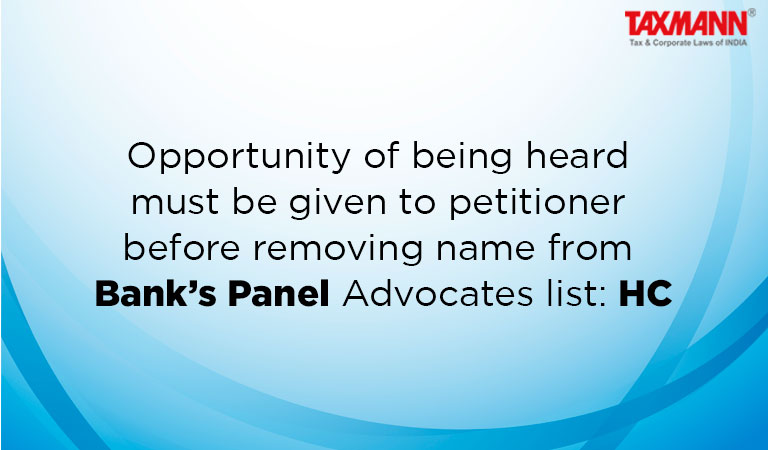Opportunity of being heard must be given to petitioner before removing name from Bank’s Panel Advocates list: HC
- Blog|News|FEMA & Banking|
- 3 Min Read
- By Taxmann
- |
- Last Updated on 8 November, 2022

Case Details: Rajan Shrivallabha Deshpande v. Bank of Baroda - [2022] 143 taxmann.com 367 (HC-Bombay)
Judiciary and Counsel Details
-
- A.S. Chandurkar & Urmila Joshi-Phalke JJ.
- M.M. Sudame, Adv. for the Petitioner.
- S.N. Kumar, Adv. for the Respondent.
Facts of the Case
In the instant case, the petitioner was a registered legal practitioner on the panel of Advocates of the respondent -Bank. The petitioner at the request of the bank issued a title report (search report) in respect of property belonging to KSL, wherein it was categorically stated that the property had a clear and marketable title.
Relying on the said search report, the Bank sanctioned financial facilities to the borrower. Subsequently, the loan account of the borrower became NPA and Bank took physical possession of the entire mortgage property except 7 shops situated on the ground floor which shop owners said that they had purchased from KSL.
The search report issued by another empanelled Advocate revealed that 7 shops were already sold by KSL prior to mortgaging the entire property in favour of the Bank. Thereafter, the petitioner’s name was removed from the list of the Bank’s Panel Advocates on the allegation that the search report submitted by him was not undertaken with due diligence.
However, the petitioner submitted that there was absolutely no negligence on his part while issuing the search report. Further, the petitioner submitted that the action of de-empanelment was completely stigmatic and arbitrary and against the settled principles of natural justice as the Bank didn’t afford any opportunity of justification to him.
Also, the petitioner had carried out the relevant search from documents available at Sub-Registrar’s Office and admittedly, there were no entries in the Index-II register as well as the record of the Sub-Registrar’s Office regarding any transaction, which had taken place between KSL and shop owners.
Further, he had suggested to the Bank to obtain an affidavit of directors authorized to extent that the company had not secured a loan from any other financial institution and that property had a clear and marketable title. However, the Bank didn’t obtain such an affidavit from any of the directors of the company.
Now, the question that arose for consideration was whether the petitioner who acted professionally and in the discharge of his professional duty renders an opinion by giving a non-encumbrance certificate to the Bank for granting a loan to a borrower certifying that he had a clear marketable title which was subsequently found unacceptable, could the petitioner be held liable for any action?
High Court Held
The High Court observed that the Bank didn’t exercise due care and caution despite the opinion of the petitioner contained in the title search report before advancing the loan to the company.
The High Court held that the petitioner having expressed his desire of not being interested in continuing on the panel of the Bank, observations that the petitioner had not submitted a title search report with due diligence and that it was a wrong title search report were to be expunged since they tend to malign the professional reputation of the petitioner without granting him any opportunity to show-cause.
The High Court, further held that as per Section 35A of the Banking Regulation Act, 1949, prior to reporting the name of a third party for fraud to Indian Banks Association (IBA), a Bank is required to satisfy itself of involvement of such third party in credit sanction/disbursement or has facilitated perpetration of fraud and also provide it with an opportunity of being heard.
List of Cases Referred to
-
- Mahabir Auto Stores v. Indian Oil Corpn. [1990] 3 SCC 752 (para 6)
- Union of India v. Kunisetty Satyanarayana [2006] 12 SCC 28 (para 6)
- Siemens Ltd. v. State of Maharashtra [2006] 12 SCC 33 (para 6)
- Kalabharati Advertising v. Hemant Vimalnath Narichania [2010] 9 SCC 437 (para 6)
- Om Prakash Chautala v. Kanwar Bhan [2014] 5 SCC 417 (para 6)
- Central Bureau of Investigation v. K. Narayana Rao [2012] 25 taxmann.com 452/115 SCL 803 (SC)/[2012] 9 SCC 512 (para 11)
- Pandurang Dattatraya Khandekar v. Bar Council of Maharashtra [1984] 2 SCC 556 (para 11).
Disclaimer: The content/information published on the website is only for general information of the user and shall not be construed as legal advice. While the Taxmann has exercised reasonable efforts to ensure the veracity of information/content published, Taxmann shall be under no liability in any manner whatsoever for incorrect information, if any.

Taxmann Publications has a dedicated in-house Research & Editorial Team. This team consists of a team of Chartered Accountants, Company Secretaries, and Lawyers. This team works under the guidance and supervision of editor-in-chief Mr Rakesh Bhargava.
The Research and Editorial Team is responsible for developing reliable and accurate content for the readers. The team follows the six-sigma approach to achieve the benchmark of zero error in its publications and research platforms. The team ensures that the following publication guidelines are thoroughly followed while developing the content:
- The statutory material is obtained only from the authorized and reliable sources
- All the latest developments in the judicial and legislative fields are covered
- Prepare the analytical write-ups on current, controversial, and important issues to help the readers to understand the concept and its implications
- Every content published by Taxmann is complete, accurate and lucid
- All evidence-based statements are supported with proper reference to Section, Circular No., Notification No. or citations
- The golden rules of grammar, style and consistency are thoroughly followed
- Font and size that’s easy to read and remain consistent across all imprint and digital publications are applied



 CA | CS | CMA
CA | CS | CMA
